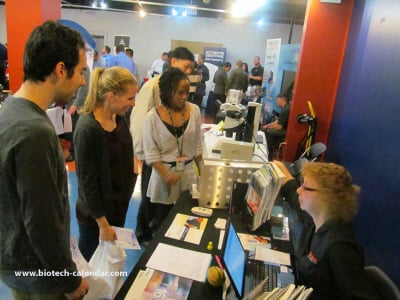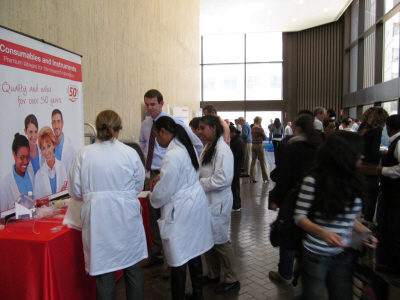Two researchers at the University of Arizona have an innovative idea for how to raise research funding at a time when federal research dollars are shrinking: the two graduate students in Anna Dornhaus’ social-insect lab have turned to crowd-funding and social media. The method of raising money for research is so new that administrators at the University of Arizona aren’t prepared to deal with it. Faculty and staff will have to wait to follow the graduate students’ lead until the university can figure out a way to defray the “indirect costs” of supervising research.
Recent Posts
Tags: 2013, University of Arizona, crowd-funding, UAZ
Researchers at Rockefeller University, led by Dr. Gaby Maimon, recently received NIH funding for their studies of fruit flies’ neuronal activity in decision-making, which they believe has the potential to impact pharmaceuticals for human mental illness. According to the Rockefeller University website, Dr. Maimon’s research team aims to “link the electrical activity of neurons and the biochemical action of molecules to their computational roles in animal behavior. The lab has a particular interest in understanding how central brain structures, distant from the sensory and motor periphery, govern behavioral choice.” The latest research grant money has been given to an ongoing project titled “Linking Genes to Higher Brain Function by Way of Cellular Electrophysiology.” The project received $2.5 million from the NIH. The NIH RePORTER details the goals of the project in an abstract posted online:
Tags: Rockefeller University, 2013, New York, RockU, NIH funding
Some of the best sales representatives at Biotechnology Calendar, Inc. life science marketing events are friendly and approachable, make the extra effort to talk with attendees, and take an educational approach to informing potential customers about products. Customers who feel as though they know a company’s life science products well rather than feel as though they sat through a sales pitch designed to sell lab equipment will be more likely to make a purchase. Researchers also trust salespeople who talk to them about how a product fits in with their research goals, especially if a salesperson can help them find a product that’s conspicuously missing from their research.
Tags: WashU, Southwest, 5-Star Winners, 5-Star Program, Midwest life science marketing events, UIUrbana, MSU, UCinci, UMich, OhStu, UIChgo
Researchers at the University of Arizona’s Arizona Cancer Center received a $3.7 million renewal of funding this year for cancer research. Led by David Alberts, who, according to the University of Arizona website, has made his career’s focus researching translational cancer prevention and treatment, the center was awarded the research funding by the NIH earlier this year. Alberts’ research teams work in laboratory-based and clinical research settings studying the chemoprevention and treatment of breast cancer, colon cancer, ovary cancer and skin cancer. The NIH RePORTER provides more information on the Arizona Cancer Center in the funding abstract:
Tags: 2013, University of Arizona, UAZ, NIH funding, NSF funding
Researchers at Ohio State University received a $4.3 million Cancer Center Support Grant from the NIH this year. Led by Dr. Michael Caligiuri, the Ohio State Comprehensive Cancer Center is one of only 41 designated comprehensive cancer centers in the nation. According to the Ohio State University website, the Arthur G. James Cancer Hospital and Richard J. Solove Research Institute are focused on creating a better understanding of laboratory, clinical and population-based cancer research. Researchers at Ohio State University make it their goal to develop more effective approaches to cancer prevention, diagnosis and therapies.
Tags: 2013, Ohio State University, Ohio, Ohio State, OhStu, NIH grant, NSF funding
Duke University’s Duke Forward program, a five-year, $3.25 billion fundraising campaign, has been going well this past year. Between July 1, 2012 and June 30, 2013, Duke University received $410.9 million in philanthropic contributions. According to a Duke University news article, this is the highest annual donations total in the university’s history.
Tags: 2013, Duke University, North Carolina, Duke
Researchers at Columbia University recently received a $5.9 million grant from the NIH for the university’s Support the Implementation and Expansion of High-Quality HIV Care and Prevention program. According to the NIH RePORTER, the project leader is David Hoos, MD. Columbia University’s HIV Prevention and Treatment Research webpage says of their HIV prevention goals:
Tags: 2013, New York, Columbia University, Columbia
Biotechnology Calendar, Inc. selects a winner of our Five Star Program at the end of every life science show who demonstrated outstanding communication and marketing skills in working to sell lab equipment and life science products. Our Five Star Winners communicate well with attendees, demonstrate their products, compose themselves professionally and create eye-catching displays. Generally, our Five Star Winners attract a large number of attendees to their table, work until the very end of the show and do an excellent job communicating their product’s message.
Tags: Emory University, 2013, University of Georgia Athens, Duke University, 5-Star Winners, 5-Star Program, South, University of North Carolina Chapel Hill, Emory, UGA, Duke, UNC
Researchers at the Fred Hutchinson Cancer Research Center and University of Washington Cancer Consortium recently received $9.8 million this year in the form of a Cancer Center Support Grant from the NIH. Corey Lawrence, President of Fred Hutchinson Cancer Research Center, was also listed as the project’s leader. According to the Fred Hutchinson Cancer Research Center website, Lawrence is an internationally respected expert in virology, immunology and vaccine development whose research focuses on herpes viruses, HIV and other viral infections, especially those connected with cancer.
Tags: 2013, Fred Hutchinson Cancer Research Center, Washington, WA, NIH grant, Hutch
Researchers at Rockefeller University received a $1.9 million NIH grant this year for the project “Identification of Cell Type-Specific Actions of Antipsychotic Drugs.” The study is being led by Paul Greengard, PhD. According to the Rockefeller University webpage, Greengard’s research aims are to understand the molecular basis of communication between neurons in the brain in mammals, clarify the molecular defects responsible for a number of neurological and psychiatric disorders and determine the molecular mechanisms by which neuro- and psychoactive drugs produce their pharmacological actions.
Tags: Rockefeller University, 2013, New York, RockU, NIH funding

















